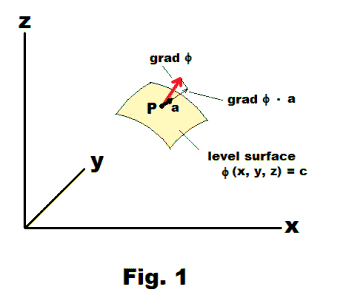
Website owner: James Miller
GRADIENT, DEL OPERATOR, DIRECTIONAL DERIVATIVE
Def. Gradient. Let Φ(x, y, z) be a scalar point function that is defined and differentiable at each point (x, y, z) in a certain region of space. The gradient of Φ is a vector point function defined as

The gradient of Φ is also denoted by

where ∇ is called the del operator.
Stated in words, the gradient of a scalar point function Φ(x, y, z) is a vector whose components along the x, y, z axes are the partial derivatives of Φ(x, y, z) with respect to the variables.
Def. Del operator. The del operator ∇ is defined by

something that has no meaning by itself. It is a contrivance that is useful in working with vector functions. It is used in defining the gradient, divergence and curl and is a thing which is convenient because it can be treated as if it were a vector in working with vector functions. It obeys vector laws and when combined with vectors gives meaningful results. It is a convenient device. It is also known as nabla.
Gradient. Physical interpretation. The gradient, at any point P:(x, y, z), of a scalar point function Φ(x, y, z) is a vector that is normal to that level surface of Φ(x, y, z) that passes through point P. The magnitude of the gradient is equal to the rate of change of Φ (with respect to distance) in the direction of the normal to the level surface at point P.
Grad Φ, evaluated at a point P:(x0, y0, z0), is normal to the level surface Φ(x, y, z) = c passing through point P. The constant c is given by c = Φ(x0, y0, z0).
Directional derivative of a scalar point function. The rate of change (i.e. derivative) of a scalar point function Φ in some specified direction is called the directional derivative in that direction.
The rate of change (with respect to distance) of Φ(x, y, z) at a point P in some specified direction is as follows: Let the direction be specified by a unit direction vector a. Then the rate of change of Φ in the direction of a is given by
grad Φ∙ a
i.e. the dot product of grad Φ and a. In other words,

where

is the directional derivative of Φ in the direction of unit vector a.

Thus the rate of change of Φ in the direction of a unit vector a is the component of grad Φ in the direction of a (i.e. the projection of grad Φ onto a ). See Fig. 1. The maximum value of the directional derivative occurs when the directional vector a coincides with the direction of grad Φ. Thus the directional derivative achieves its maximum in the direction of the normal to the level surface Φ(x, y, z) = c at P.
Jesus Christ and His Teachings
Way of enlightenment, wisdom, and understanding
America, a corrupt, depraved, shameless country
On integrity and the lack of it
The test of a person's Christianity is what he is
Ninety five percent of the problems that most people have come from personal foolishness
Liberalism, socialism and the modern welfare state
The desire to harm, a motivation for conduct
On Self-sufficient Country Living, Homesteading
Topically Arranged Proverbs, Precepts, Quotations. Common Sayings. Poor Richard's Almanac.
Theory on the Formation of Character
People are like radio tuners --- they pick out and listen to one wavelength and ignore the rest
Cause of Character Traits --- According to Aristotle
We are what we eat --- living under the discipline of a diet
Avoiding problems and trouble in life
Role of habit in formation of character
Personal attributes of the true Christian
What determines a person's character?
Love of God and love of virtue are closely united
Intellectual disparities among people and the power in good habits
Tools of Satan. Tactics and Tricks used by the Devil.
The Natural Way -- The Unnatural Way
Wisdom, Reason and Virtue are closely related
Knowledge is one thing, wisdom is another
My views on Christianity in America
The most important thing in life is understanding
We are all examples --- for good or for bad
Television --- spiritual poison
The Prime Mover that decides "What We Are"
Where do our outlooks, attitudes and values come from?
Sin is serious business. The punishment for it is real. Hell is real.
Self-imposed discipline and regimentation
Achieving happiness in life --- a matter of the right strategies
Self-control, self-restraint, self-discipline basic to so much in life